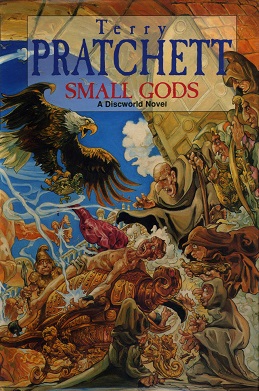Small Gods
 |
|
| Author | Terry Pratchett |
|---|---|
| Language | English |
| Series |
Discworld 13th novel – 3rd individual story |
| Subject | |
| Genre | Fantasy |
| Publisher | Victor Gollancz |
|
Publication date
|
1992 |
| ISBN | |
Small Gods is the thirteenth of Terry Pratchett's Discworld novels, published in 1992. It tells the origin of the god Om, and his relations with his prophet, the reformer Brutha. In the process, it satirises religious institutions, people, and practices, and the role of religion in political life.
The Great God Om tries to manifest himself once more in the world, as the time of his eighth prophet is nigh. He is surprised, however, when he finds himself in the body of a tortoise, stripped of his divine powers.
In the gardens of Omnia's capital he addresses the novice Brutha, the only one able to hear his voice. Om has a hard time convincing the boy of his godliness, as Brutha is convinced that Om can do anything he wants, and would not want to appear as a tortoise.
Brutha is gifted with an eidetic memory and is therefore chosen by Vorbis, the head of the Quisition, to come along on a diplomatic mission to Ephebe. However, Brutha is also considered unintelligent, since he never learned to read, and rarely thinks for himself. This begins to change after Brutha discovers Ephebe's philosophers; the idea of people entertaining ideas they're not certain they believe or even understand, let alone starting fistfights over them, is an entirely new concept to him.
With the help of Ephebe's Great Library, and the philosophers Didactylos, his nephew, Urn, and Abraxas, Om learns that Brutha is the only one left who believes in him. All others either just fear the Quisition's wrath or go along with the church out of habit. While in Ephebe, Brutha's memory aids an Omnian raid through the Labyrinth guarding the Tyrant's palace. While in the library of Ephebe, Brutha also memorizes many scrolls in order to protect Ephebeian knowledge as Didactylos sets fire to the building, to stop Vorbis reading the scrolls there.
...
Wikipedia
